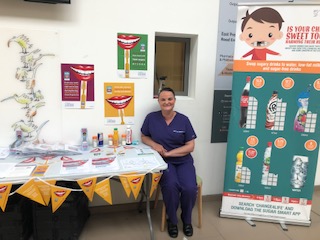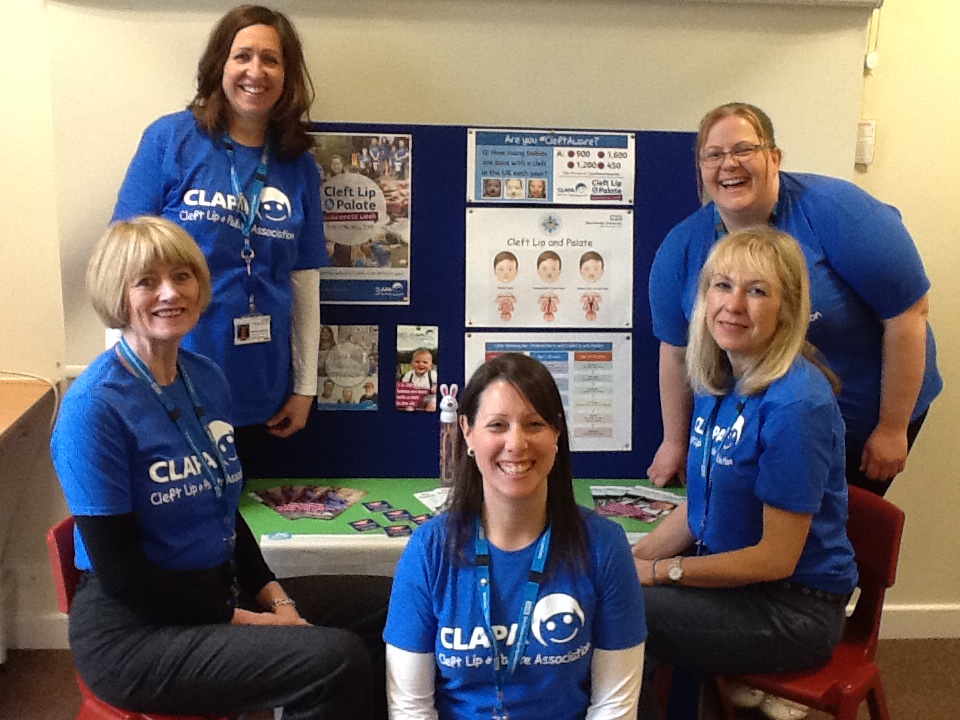News
Dear Families,
In previous years, the North West, North Wales and Isle of Man Cleft Lip & Palate Network have arranged an event called “School Change Day”. This is a workshop run by the Clinical Psychologists and Speech and Language Therapists for children who are due to transition to secondary school and their parents/carers.
For the last couple of years, we have been unable to offer a face-to-face workshop, but would like to share an information pack instead. The pack has been designed by Clinical Psychologists from Cleft Services across the UK to address some of the things we are often asked at this stage of a child’s life. The pack makes reference to growing up with a cleft lip and/or palate, but much of the information is also relevant for those with other difficulties (including non-cleft related speech concerns).
Please click on the links to access:
- A Feedback Survey – This is to Gather Feedback on the ‘Moving Up’ Booklets. There is a section at the start to be completed before you read either of the booklets.
- A ‘Moving Up’ Booklet for Parents/Carers
- A ‘Moving Up’ Booklet for Children
Also, some extra information:
- An Information Booklet for Schools from CLAPA (The Cleft Lip and Palate Association)
- A Template Letter for Schools from CLAPA
- An Information Flyer for CLAPA’s Children and Young People’s Services
- A One-Page Communication Profile
- An Additional High School Survival Guide
We hope you and your child will find this information helpful for their upcoming move to secondary school. Whilst there have been some changes since last year, children moving schools this year are doing so in particularly uncertain times. Children might not have had the usual opportunities to say goodbye to their old school, friends and teachers, or to explore their new school this year. This might have been disappointing or upsetting for some. We hope all young people are able to find some way to mark this special occasion and wish them all the very best with the move ahead.
If you have any questions about the pack, or any concerns relating to your child’s cleft you are welcome to contact the Cleft Coordinator for the team who support you:
Royal Manchester Children’s Hospital: 0161 701 9091
Alder Hey Hospital: 0151 252 5209
We would also encourage you to contact your child’s school (either primary or secondary) should you have any concerns or questions about the transition. Finally, there are additional resources for children with cleft and their families (including information and social activities) on CLAPA’s website: www.clapa.com
Best Wishes,
The North West, North Wales & Isle of Man Cleft Network
The skin camouflage service is available for Cleft Lip patients at Royal Manchester Children’s Hospital
If you’ve had a cleft lip repair, you may have a visible scar that makes you look a little different. We call this a visible difference. There is no right way to feel about having a visible difference, some people feel more comfortable when the scar left from surgery is not as noticeable.
Skin camouflage offers products and techniques patients can use that differ from traditional concealer products. These products are more pigmented and long-lasting. Originally designed as a ‘scar crème’ for soldiers they are easy to use giving full coverage with a natural look.
What is Skin Camouflage?
‘Skin camouflage’ refers to specialist cover creams that are designed to conceal discolouration or scarring when applied to the skin. Blended into the surrounding unaffected skin to create a natural look and reduce the appearance of imperfections.
The products
The products are not intended to alter the condition of the skin, but aim to replicate the skin’s natural colour and appearance. They are fully waterproof and opaque. This means they adhere better to skin that has become more textured and are formulated to give excellent coverage using a thin application.
Consultation
In order to learn how to apply the products patients are offered a consultation with a specially trained practitioner. Our practitioner find the best colour match for each person’s skin tone. The patient will be taught how to easily cover their cleft lip scarring. One application should last all day.
At first the process may seem complicated but will soon become easier.
Skin camouflage products can become a hassle-free part of a daily routine and can give patients the freedom to choose how much they want to reveal.
Who are skin camouflage products suitable for?
The products are suitable for men, women and children. They are not usually recommended for babies or very young children unless suggested by their doctor.
How do I obtain skin camouflage products?
Some skin camouflage creams and powders are available on NHS prescription. These are considered discretionary and the reason for camouflage use may be denied. Your GP will advise you what is available and should write the prescription for you to take to your pharmacy.
The same products can be purchased without a prescription by ordering them at the prescription counter. Concealer products are available to buy in shops. These may be helpful in camouflaging minor discoloration, but may not have be effective on cleft scarring.
What to do if you would like to be referred to the skin camouflage programme?
If you would like a referral, speak to a member of the Cleft team. The referral will be discussed with the consultant cleft surg
eon, who will confirm they are happy for you to be considered. If no concerns are raised, you will be offered a clinical psychology assessment. After this assessment, if are no concerns you will be offered a skin camouflage consultation. If any concerns are raised, alternative options will be explored.
The Products:-
Contain ultra-violet sun protecting properties
Oil-free sun protection, topical medication and emollients can be applied under the camouflage
Silicone scar treatment can be applied under the camouflage but not silicone sheeting
If required, decorative (oil-free) make up can be applied over the set camouflaged area
Creams will easily mix together to create an acceptable match for your skin colour.
Camouflage is smudge and smear resistant
Camouflage is waterproof. You can swim or shower so long as care is taken afterwards to gently pat
the area dry
Camouflage can be removed and immediately reapplied with no adverse effects
Where can I get m
ore information about skin camouflage?
Call the Manchester Cleft Unit, RMCH on 0161 701 9091
British Association of Skin Camouflage (NHS and private practice)
Tel: 01254 703 107
Email: info@skin-camouflage.net
Web: www.skin-camouflage.net
Changing Faces
Tel: 0300 012 0276 (for the Skin Camouflage Service)
Email: skincam@changingfaces.org.uk
Web: www.changingfaces.org.uk
Here at Alder Hey Children’s Hospital we were celebrating and promoting National Smile Month one of the largest and longest running campaigns to promote good oral health.
National smile month promotes three main messages :
- Brush your teeth last thing at night and at least one other occasion with fluoride toothpaste.
- Cut down on how much sugary food and snacks you have and how often you have them
- Visit your dentist regularly, as often as recommended


The stall went well and we gave away a large amount of CLAPA merchandise as well as information leaflets. The ‘make a smile for CLAPA’ competition is under way and our ‘bake a smile for CLAPA’ fundraiser was held at lunchtime
We are holding our annual School Change Day for young people (aged 10-11 years) and their parents who receive care from the North West, Isle of Man and North Wales Cleft Lip and Palate Network. We are running our annual School Change Day for all young people who are due to move to secondary school in September 2019 on Wednesday 26th June 2019 between 10:00 and 16:00.
The event will be held at the “Institute in the park” at Alder Hey Children’s Hospital in Liverpool. The day includes separate workshops for young people and parents, and lunch and refreshments will be provided!
Cleft Awareness Week 4th to 12th May
Royal Manchester Children’s Hospital
- Tuesday 7th & Wednesday 8th May 2019 – A stall in the atrium to highlight CLAPA and give away free merchandise
- All week – ‘Make a smile for CLAPA’ competition in our cleft waiting room/s – decorate a paper plate to make a smiley face these are to be judged by a Cleft Surgeon and a prize of a Furbie for older patients (aged 6 years +) and Mr Potato Head (for younger patients aged 2 – 6 years) to be posted out to the winners.
Cleft Awareness week is about helping everyone in the United Kingdom understand the impact of a cleft, and the different that the right support can make.
This May the CLAPA community will come together to raise funds, organise events, and help to raise awareness. From putting up posters in clinic to hosting a fundraising event, there are so many ways you can get involved this year! Find out more and request you free materials at
www.clapa.com/awareness-week
CLAPA’s 40th Birthday
June this year marks CLAPA’s 40th birthday as a charity. To mark this occasion, we’re encouraging our supporters to throw a party from May to June to raise funds and awareness.
If you’d like to get involved, get in touch with our friendly fundraising team to request your free materials, including our special ‘party hat’ cake toppers for any bake sales.
As part of our celebrations, we will be publishing an article about our history and hopes for the future of cleft support in the UK, featuring interviews and contributions from supporters, beneficiaries and health professionals throughout the years. If you would like to be interviewed as part of this article, please get in touch at info@clapa.com
Visit www.clapa.com/clapa40 for more information.
Adult Services Project
The Adult Service Project is focussing in its second year on improving patient knowledge of CLAPA and NHS services that are available to them.
We are hoping to achieve this in a variety of different ways including working with cleft teams to develop a ‘LeaversPack’ including information about commonly asked questions, how to return to the cleft service as an adult. We would really like to welcome a group of representatives from the cleft team to provide feedback on this document. Additionally, we are hoping to create a resource for General Practitioners to help them make referrals to the right place, first time. We are also doing some more direct engagement with adults including our conference in Glasgow on the 14th September, and our new monthly video panel discussions.
Visit clapa.com/adultservicesproject to find out more and become involved



